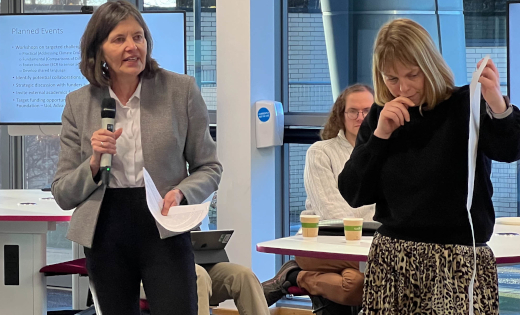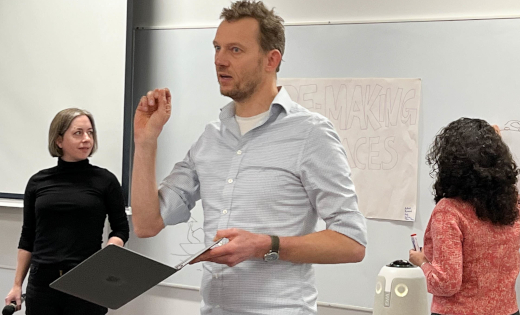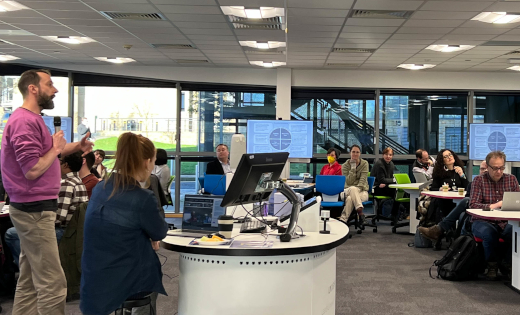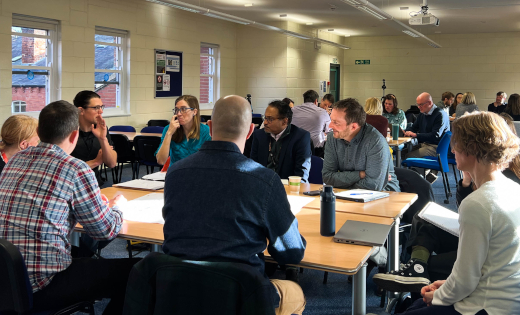New networks addressing key scientific and societal challenges
Colleagues can get involved with four new interdisciplinary networks launched by the Horizons Institute to develop cutting-edge research solutions to some of the most pressing global challenges.
Horizons Institute Director, Professor Stuart Taberner, addresses the first Collaborative Labs event

Due to launch in September, the groups – Reimagining Ageing; Remaking Places; Interdisciplinary Research Network on Time; and Global Biosphere Sensing Network – will receive funding and support to develop their ideas during a 12-month period.
These will be part of the second cohort for the network-building programme, with the successful 2022/2023 cohort including the InterActiveUoL, Leeds Interdisciplinary Mental Health Research Network (LIMHRN), and Antimicrobial Resistance (AMR) at Leeds.
Colleagues interested in working with the new networks are invited to get in touch.
Professor Nick Plant, Deputy Vice-Chancellor: Research and Innovation. said: “These new Horizons Challenge Networks will significantly impact on key scientific and societal challenges, and I’m delighted to see each has fully embraced the University’s vision to make a positive difference locally, nationally and globally.
“I’m looking forward to seeing how these research networks develop over the next year, creating meaningful connections across our University and beyond. I hope colleagues from all faculties will feel inspired to join, support and benefit from these exciting collaborative initiatives.”
Horizons Institute Director, Professor Stuart Taberner, said: “The Horizons Challenge Network programme is designed to galvanise novel interdisciplinary research and collaboration right across the University.
“We’re delighted that our new networks create opportunities for colleagues at all career stages and from all disciplines to work together on developing cutting-edge research ideas and workable solutions to contemporary societal challenges.”

Professor Anne Forster and Dr Sarah Astill discuss themes about Reimagining Ageing
Reimagining Ageing
Network Leads – Dr Sarah Astill, Professor Anne Forster and Dr Maria Kapsali
Reimagining Ageing aims to facilitate interdisciplinary collaboration to develop novel, imaginative solutions to the global challenge of healthy ageing, with a focus on reducing inequalities in later life.
Addressing the opportunities of ageing is also identified as a priority by the United Nations, the UK Government, research funders such as UKRI and NIHR and communities in Leeds and Bradford.
The focus for the network is centred around the ideal view of ageing – How would we like to age? What information is needed to inform creation of a better, and more enjoyable, environment in which to grow old? What can we do to support this vision?

Dr Katy Wright, Professor Paul Chatterton and Dr Radhika Borde present Remaking Places to colleagues and guests
Remaking Places: An interdisciplinary network for safe and thriving places
Network leads – Dr Radhika Borde, Professor Paul Chatterton, Dr Helen Graham, Professor Gehan Selim and Dr Katy Wright
Remaking Places is a network that supports place-based coalitions to radically reimagine, rethink, learn, act upon and make practical interventions to build thriving, hopeful, joyful, safe and resilient places.
Drawing on research from across University on place and the urgent challenges that arise from the triple emergencies – climate, nature, social – the Remaking Places Network seeks to catalyse research from across faculties into a transformational force, able to activate new ways of knowing into radical experimentation and action.

Professor Tim Heaton shares his thoughts about the Interdisciplinary Network on Time
Interdisciplinary Network on Time
Network leads – Professor Tim Heaton, Dr Kahryn Hughes and Dr Chris Birchall
Time plays a fundamental role in our lives, spanning the deepest mysteries of the natural world, the formation of our societal and individual belief systems and the basis for decisions we take for the future. But time is usually in the background of research. This research network will make intellectual leaps in a number of disciplines by moving it to the foreground.
The network takes three global challenges – climate change, social inequity and productivity – to generate ideas for research questions. It will confront and blend viewpoints of physicists, astronomers, geologists, psychologists, social scientists, historians, prehistorians, artists, economists, philosophers, the community, organisations and policymakers.

Dr Ryan Neely talks with the Global Biosphere Sensing Network group
Global Biosphere Sensing Network
Network leads – Dr Ryan Neely III, Dr David Williams and Dr Simon Goodman
New technology is needed urgently to address the interconnected global challenges of biodiversity loss, emerging pathogens and sustainable agriculture.
Real-time biosensor networks return information about the status and stresses of ecosystems, or detect and monitor pathogens in the environment. In the same way global weather and climate observing networks revolutionised understanding of the physical environment, deployment of biosensing networks will fundamentally change how we collect information about the living world and make environmental policy decisions.
At the same time, global collection of bio-monitoring data creates unprecedented ethical challenges around surveillance and equitable information access.
Such advances are coming in the next decade, and this network will utilise this early opportunity to lead that agenda, building internal networks to unite dispersed activity across the University and make new relationships with external technology users and policymakers.
Supporting collaborative conversations
Leading this work from the Horizons Institute is Research Manager for Creativity, Partnership and Impact, Abi Rowson, together with Challenge Network Coordinator, Rosemary Sannaee.
Abi said: “There’s huge potential within each of these new networks to harness the power of collaboration to deliver solutions to seemingly intractable global challenges. Horizons provides a platform to make connections across campus, to facilitate new conversations between researchers and to forge strategic partnerships beyond Leeds.
“These new groups follow in the footsteps of three dynamic networks, whose activity to date has shown how much can be achieved with some targeted support, whether in novel interdisciplinary research development, policy engagement or commissioned research. Our new cohort will be able to learn from these successes as they begin to build relationships and make a start on what I’m sure will be exciting journeys.”
Rosemary added: “My role will be to support the new networks with their initial launch, events, communication and general administration, as well as helping to form links between the networks and supporting new collaborative conversations and relationships as they emerge.
“I’m really excited to be working with these interdisciplinary networks in developing their ideas further and in building their communities.”
Get involved
Please contact the Horizons team at horizons@leeds.ac.uk if you would like to learn more about these networks or to speak with the network leads.
Posted in: Research and innovationUniversity news